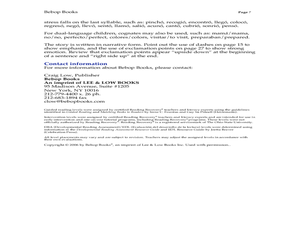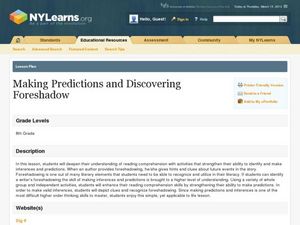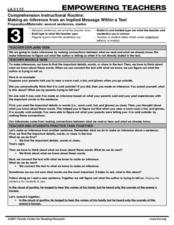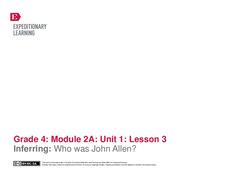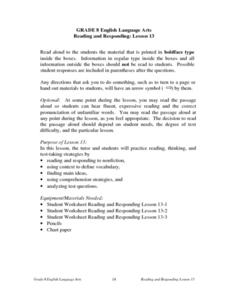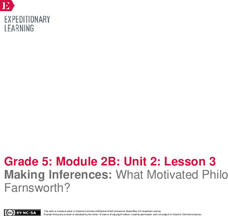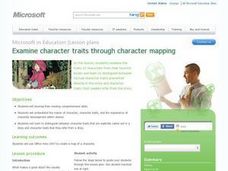Southern Nevada Regional Professional Development Program
Close Reading in the Classroom
Close reading is key to the analysis and interpretation of literature. A close reading of the title and the epigraph of “The Love Song of J. Alfred Prufrock” offers readers an opportunity to examine how even single words or names can...
Curated OER
Comprehension Strategies: Drawing Inferences
The proof is in the details! A richly detailed plan provides clear examples of how to draw inferences from text and how to provide support drawn directly from the text.
Curated OER
Guided Reading with Elizabeti's Doll
Practice reading strategies using Elizabeti's Doll by Stephanie Stuve-Bodeen. Readers utilize decoding and comprehension strategies before, during, and after reading the story. A detailed list of text features, high frequency words,...
Curated OER
Mini-Lesson Planning for Inferences
Making inferences and drawing conclusions is a key component to successful active reading. Encourage your class to use context clues and prior knowledge to infer different elements of a story, including the setting, plot, and character...
Curated OER
Book Discussions in a Reading Partnership
Do you have a lot of different reading levels in your class? Pair kids up by level and have them choose a book to read independently. They will make predictions, ask questions, make connections, etc. Consider creating a general reading...
Curated OER
Foreshadowing and Making Predictions
"What happens next?" Using real-life scenarios, movies, images, and other prompts, pupils practice making predictions based on inferences from clues. A SMART board activity takes them from making predictions to writing a prediction...
Curated OER
Making an Inference from an Implied Message Within a Text
Show your scholars that they make inferences every day and might not even know it. Through scaffolded instruction, they break down the process of drawing information from context. Using example sentences and didactic questioning,...
EngageNY
Taking Notes Using a Graphic Organizer: Inferring About the Importance of Religion in Colonial America
Improve class understanding of colonial times by reading an informational text and filling out the accompanying graphic organizer. Class members work with a partner to read, take notes, make inferences, and synthesize information.The...
EngageNY
Taking Notes Using a Graphic Organizer: Inferring About Work and Play in Colonial America
What was life like in colonial America? Follow this lesson and your pupils will find out what people in colonial times did for work and for fun. Ask learners to compare and contrast the two texts and explain what the reading helped them...
Curated OER
Guided Reading: Asking Questions
Here is a reading strategies lesson in which learners use post it notes to create a bulletin board. They post their new questions on the bulletin board and look back at questions they have already learned the answer to. A great idea,...
Curated OER
Foreshadowing and Prediction: W.W. Jacob's, "The Monkey's Paw"
W.W. Jacobs' story "The Monkey's Paw" provides plenty of foreshadowing which readers use to make predictions in this tightly composed, sound instructional plan. Your class reads the story, recording predictions and checking for veracity...
EngageNY
Inferring about Character: Close Reading of The Lightning Thief (Chapter 3)
Stick it to them! Scholars work to write the gist of sections of text on sticky notes and place them in chapter three of The Lightning Thief. They then share what they wrote with classmates in their triad. The group reads selections of...
Curated OER
Two Greedy Bears
Improving listening comprehension skills is the goal of this language arts lesson. Young readers listen to the story Two Greedy Bears, stopping to have discussions with a partner. They predict outcomes and make inferences based on...
EngageNY
Inferring: Who was John Allen?
Help your learners work with difficult or archaic words. A continuation of lesson two of this module, the plan here focuses on deciphering the Inventory of John Allen, in particular the unfamiliar words that make up much of the list. Add...
Curated OER
Using Random Sampling to Draw Inferences
Emerging statisticians develop the ability to make inferences from sample data while also working on proportional relationships in general. Here, young learners examine samples for bias, and then use random samples to make...
EngageNY
Mid-Unit Assessment: Close Reading of the "Spadefoot Toad"
A mid-unit assessment challenges scholars to use their close reading skills to identify the main idea and key details. After reading a brief excerpt, learners answer a series of questions—multiple-choice, short answer—complete a graphic...
Curated OER
Reading and Responding -- Lesson 13
Fourth graders work independently or in a small group to (1) read a fictional passage, (2) use context to define unfamiliar vocabulary, (3) use comprehension strategies, and (4) make inferences. Reading passage and teacher script is...
Curated OER
Shizuko’s Daughter: Selective Reading Guide
Examine the text of Kyoko Mori's Shizuko's Daughter with a reading guide. With questions that prompt kids to refer to the reading as well as to their own experiences and opinions, the guide is an effective way to keep them engaged...
EngageNY
Making Inferences: What Motivated Philo Farnsworth?
Turn on the tube. Learners take a look at pages 10-13 of The Boy Who Invented TV. They work in groups and complete a first read to determine the gist of the section. They then reread the pages to make and revise previous...
K20 LEARN
Considering "Charles": Pictograms, Annotations, Reading Strategies, And Multimodal Responses
Shirley Jackson's short story, "Charles," provides middle schoolers with an opportunity to practice their close reading skills. Using the provided list of prompts, scholars read and reread the story, then create a multimodal response to...
Curated OER
High Wire Magazine: Turning Points
Develop and strengthen reading comprehension strategies through this comprehensive teaching guide. Your learners will practice making text connections, inferences, predictions, and more using reading passages from the teen-appropriate...
Curated OER
Examining Character Traits through Character Mapping
Some of what we know about a character is directly stated. Some of what we know is inferred by events in the story. Character maps help primary learners recognize the difference. After modeling with a story your class has read, pupils...
K20 LEARN
OPTIC - A Reading Strategy Recipe: Visual Literacy
A visual literary lesson plan provides learners with OPTIC (Observations, Predictions, Themes, Inferences, Conclusions), a reading strategy to help them understand and interpret visual and written texts. Scholars practice the strategy...
Curated OER
Build Mastery: Making Inferences
Do your youngsters realize that they are constantly making inferences? Expose this inner process by bringing out the book they will be reading. Ask scholars what they think the plan is, and explain that their answers are the product of...




